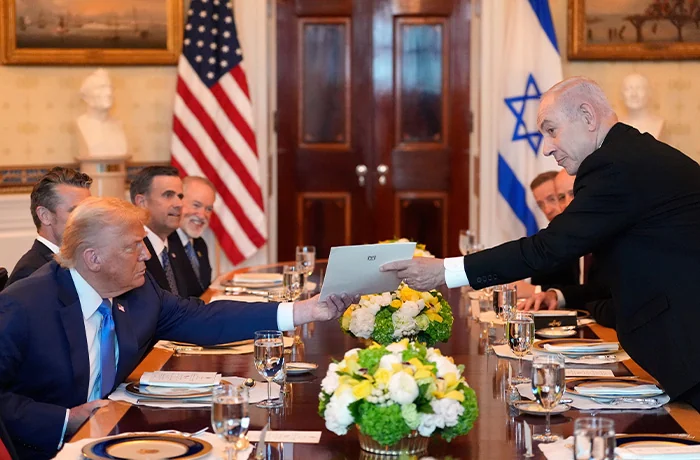
JERUSALEM — The recent American and Israeli military strikes on Iran’s nuclear power sites boosted Israeli Prime Minister Benjamin Netanyahu’s flagging domestic standing, at least among his right-wing constituents. Whether Netanyahu can maintain this momentum and win the country’s next election could depend on President Donald Trump’s next steps in the Middle East.
“Netanyahu will play up his ‘unique’ relationship with Trump in the run-up to the next election, assuming he has a good relationship by then,” said Anschel Pfeffer, a journalist for the Economist and
author of Bibi: The Turbulent Life and Times of Benjamin Netanyahu.
The prime minister’s White House meeting with Trump on July 7 came 21 months after the worst terrorist attack in Israel’s history, when Hamas terrorists operating from Gaza killed about 1,200 people and took 251 hostage.
On that recent summer day at the White House, Netanyahu “basked in the glory” of the Iran strike with Trump, Pfeffer said, and announced that he nominated the president for the Nobel Peace Prize. “Whether this was enough to make the Israeli electorate forgive the biggest leadership failure in 50 years remains to be seen.”

Slated for October 2026, the country’s national election could occur sooner if Netanyahu or one of his coalition partners decides to dissolve the current government.
“We may come to see this White House visit as the unofficial launch of Netanyahu’s election campaign,” Pfeffer said.
The so-called “Trump Effect” on war-weary Israelis cannot be overstated. In the most recent poll of Israeli attitudes by the Israel Democracy Institute, conducted after U.S. fighter jets attacked Iran’s Fordow Uranium Enrichment Plant, 60% of the respondents said Israel’s security “is a central consideration” for Trump. The rate of optimism for the future of Israel’s national security rose from 37% last month to 51% in July.
Even so, under half of the respondents said there is a “high likelihood” of a deal to end the war with Hamas that will result in the release of the 20 hostages still believed to be alive.
When it comes to Gaza, the prime minister is caught between the demands of his government’s most extreme elements and Trump’s vision of how to deal with Hamas and Iran. From this point on, Trump seeks negotiations, not further confrontation, with Iran and an immediate ceasefire in Gaza leading to a permanent end of hostilities.
Without the support of his coalition’s two ultra-Orthodox political parties, Netanyahu’s government will collapse, triggering new elections within three months. Hours before Netanyahu met Trump, the ultra-Orthodox Shas and United Torah Judaism parties refused to vote on any legislation until the government presents a bill that would exempt the vast majority of army-age ultra-Orthodox men from Israel’s mandatory military service.
Many in Netanyahu’s coalition government oppose an exemption, believing it to be not only unfair to other draft-age Israelis but political suicide.
Meanwhile, Netanyahu’s far-right-wing parties are also threatening to topple the government if Netanyahu agrees to a permanent ceasefire with Hamas. They adamantly opposed the creation of a Palestinian state and are pressing for all Palestinians to leave Gaza. They support the war’s continuation until Hamas is destroyed or exiled from Gaza — a goal many in Israel’s military establishment consider
unattainable.
As much as Trump would like to see Hamas defeated, “for him it is more important to end the war than to end the rule of Hamas,” said Efraim Inbar, president of the Jerusalem Institute for Strategy and Security at Shalem. “This is why Netanyahu prefers interim agreements with Hamas,” and not the permanent ceasefire and total withdrawal of Israeli troops from Gaza that Hamas is demanding. Like Trump, Netanyahu wants the war to end as soon as possible, but only if it is “a clear victory and an end to Hamas.”
Netanyahu knows he needs a definitive political win right now, given his perceived culpability for leaving the country’s Gaza-Israel border vulnerable to attack. At the White House, he said Israel will “always” keep security control over the Gaza Strip. “People will say [Gaza] is not a complete state, it’s not a state. We don’t care.”
“He wants Israelis to forget his role in October 7, but he cannot run away from it,” Inbar said. “He was the architect of shoring up Hamas in Gaza in an attempt to weaken the Palestinian national movement. He can try to blame the military and the intelligence branch, but he was, and is, the prime minister. He portrayed himself as ‘Mr. Security,’ and he blew it.”
Trump seems to want Netanyahu off the hot seat. Last month, in a social media post, the president accused Israel’s court system of carrying out a “witch hunt” for trying Netanyahu on corruption
charges. Netanyahu’s critics have long accused him of continuing the war in Gaza in an attempt to push off charges of bribery, fraud, and breach of trust.
Rachel Brandenburg, the Washington managing director and senior fellow at the Israel Policy Forum, warns against putting too much stock in Trump’s interventions into Israeli affairs.
“Trump wants to position himself as a peacemaker, and elevating Netanyahu is only a means to achieve his own ends, not an end in itself,” Brandenburg said. “As much as he genuinely wants to expand
the Abraham Accords and get as many historic deals as he can, he sees Netanyahu as a tool. Maybe Trump feels he can deal with him.”
Netanyahu needs to understand that Trump is losing patience over the war in Gaza, Brandenburg said. “Trump wants the war to end to move on to bigger deals,” including possible normalization agreements between Israel and Syria, Lebanon, and eventually Saudi Arabia.
JEFFREY EPSTEIN COMMITTED SUICIDE, HAD NO ‘CLIENT LIST,’ FBI AND DOJ FIND: REPORT
“Netanyahu has a choice,” Brandenburg added. “He can play to members of his coalition and not end the war in Gaza, or he can take the political risk to bring home the hostages and to open the door to the opportunity to consolidate the military gains Israel has attained into a transformational win for Israel.”
The reward for agreeing to end the war “could be so much better than the risk.”
Michele Chabin is a journalist whose work has appeared in Cosmopolitan, the Forward, Religion News Service, Science, USA Today, U.S. News & World Report, and the Washington Post.



![[GOOD PRESS] ON[GOOD PRESS] ON](https://georgemagazine.com/wp-content/uploads/2024/08/16389056566437433941_2048-300x300.jpeg)